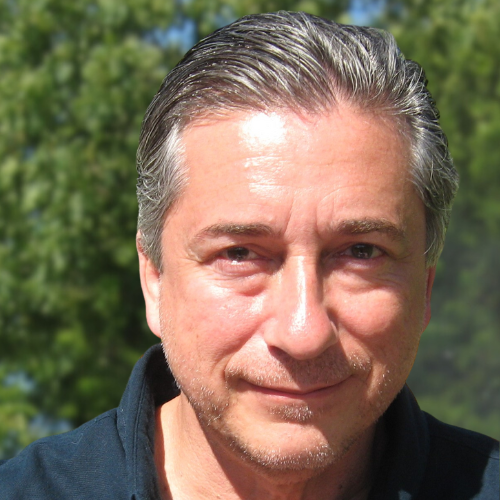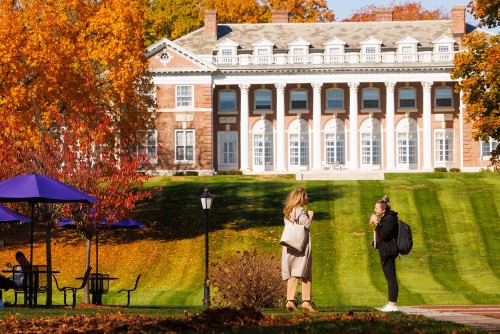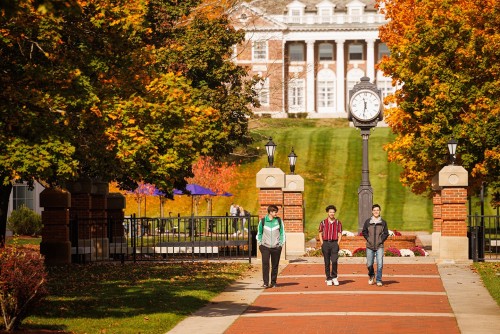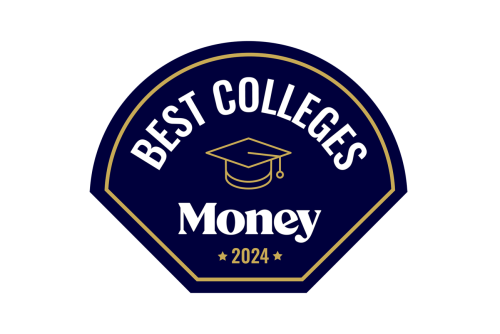Electrical Engineering Major & Minor
The Electrical Engineering program at Stonehill College seeks to provide students with the skills and background needed to thrive in their profession while also giving them the intellectual flexibility that comes from a well-rounded liberal arts education.
Notre Dame: A Key Engineering Path for Stonehill
Building on Stonehill’s four-year computer and electrical engineering programs, the five-year Notre Dame partnership provides an opportunity with unique benefits.
Program Overview
Stonehill seeks to develop engineer-innovators who design, explore, and create.
Students have the option of pursuing a four-year bachelor of science degree in electrical engineering or a minor in the discipline.
Unlike the highly specialized engineering degrees provided at research universities, our approach is intended to be interdisciplinary and application-oriented, and to emphasize the moral and social background within which the engineer will be working.
About the Electrical Engineer Minor
The Electrical Engineering minor is available to all students at the College except those pursuing a major in Computer Engineering. It requires a minimum of six courses offered as part of the Electrical Engineering major. Four courses must be unique to the minor and may not count toward the fulfillment of majors or additional minors. The Electrical Engineering minor is not intended to provide specialization within an engineering discipline but is designed to complement different majors offered at Stonehill College. Non-Engineering majors are allowed to pursue a minor in Electrical Engineering, provided that the course pre-requisites are met.
A Unique Focus on Emerging Field of Humanistic Engineering
Stonehill’s Engineering Program is grounded in the practice of humanistic engineering. It prepares students for leadership, service and global citizenship. Consistent with the mission of the College, the engineering curriculum fosters critical thinking and emphasizes the understanding of societal and human needs.
In addition to core engineering courses for electrical engineering, all engineering students are required to take two humanistic engineering courses —Sustainable Engineering Design and Engineering for Public Good. The sequence of two humanistic engineering courses, offered during junior year, combined with two semester of sustainable development capstone project course, sets Stonehill’s program apart from traditional engineering programs.
Makerspace for students to experiment, explore and exchange ideas with one another.
Recent Accolades
Organizations involved in assessing U.S. colleges and universities continually cite Stonehill as being among the best in the nation when it comes to value, outcomes and a commitment to making the world a better place. See full list of accolades.
-
U.S. News Ranks Stonehill in the Top 5% Nationally
After assessing U.S. colleges and universities based on 17 measures of academic quality and graduate outcomes, U.S. News & World Report ranked Stonehill No. 73 in the Best Value category out of 1,500 colleges, while also moving up to No. 83 among National Liberal Arts Colleges.
-
Wall Street Journal 2025 Rankings Place Stonehill Among Best Colleges in U.S.
Stonehill College has been recognized again this year by The Wall Street Journal for the value it provides students, especially in the areas of career preparation and character development.
-
Money Ranks Stonehill Among Best U.S. Colleges in 2024
Money’s 2024 Best U.S. Colleges research shows Stonehill among top 10% nationwide.
Sample Courses
Semiconductor Materials and Devices
Computer Logic and Organization
Exceptional Opportunities
Earn a Bachelor's and Master's Degree in 5 Years
Stonehill Undergraduate Research Experience (SURE)
The Stonehill Undergraduate Research Experience (SURE) is an opportunity for students who have completed their first year at Stonehill to perform significant, publishable, full-time research under the guidance of and in collaboration with an experienced faculty researcher.
3+2 Dual-Degree Engineering Programs
In addition to its on-campus four-year engineering programs, Stonehill also offers dual-degree engineering programs through partnerships with two of our sister schools – The University of Notre Dame in Indiana and King’s College in Pennsylvania. The partnerships offers students the potential opportunity to earn two bachelor's degrees in five years; studying three years at Stonehill for a science degree and two years at our partner school for their engineering degree.
A Growing Industry
The national projected growth in the electrical engineering industry is high. And with numerous opportunities and career paths available, Stonehill students will gain the skills and background needed to thrive in their chosen profession.
Over the past year, there have been 15,823 job postings in the Boston-Cambridge-Nashua, Massachusetts-New Hampshire region that require an Electrical Engineering degree.
According to Burning Glass Technologies, the field is expected to grow by 14% in the Boston area and by nearly 16% nationwide.
Career and Internship Opportunities
Demand in the computer engineering industry is highest in the following metropolitan areas, with Boston-Cambridge-Nashua, MA-NH ranked 7th in the country.
- Los Angeles-Long Beach-Anaheim, CA
- New York-Newark-Jersey City, NY-NJ-PA
- San Francisco-Oakland-Hayward, CA
- Washington-Arlington-Alexandria, DC-VA-MD-WV
- Dallas-Fort Worth-Arlington, TX
- Advanced Automation & Robotic Systems
- Aerospace & Space Defense Systems
- Computer Hardware & Signal Processing
- Systems Engineering
- Electrical Engineering
- Electrical Engineering Internship
- Quality Engineering Intern
- Electrification Technology Development Intern
- Manufacturing – Emerging Leaders Internship
- Grid Management Intern
- Distribution Design Engineer
- Energy Efficiency Intern
- Electrical Engineer
- React Developer
- Controls Engineer
- Artificial Intelligence & Machine Learning Innovation Engineer
- Engineer – RF Signal Processing
- ADAS System Engineer
- Hardware Support Engineer
Career Development Resources for Students
The Career Development Center offers extensive assistance to students seeking employment, pursuing advanced studies or participating in postgraduate service opportunities. By completing internships and utilizing mentors, students are empowered to build lifelong career management skills.
Contact Information



